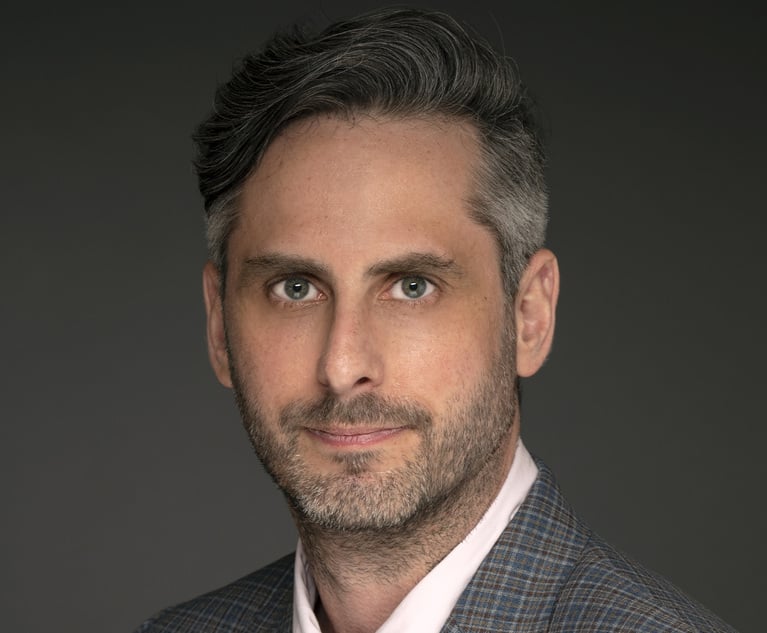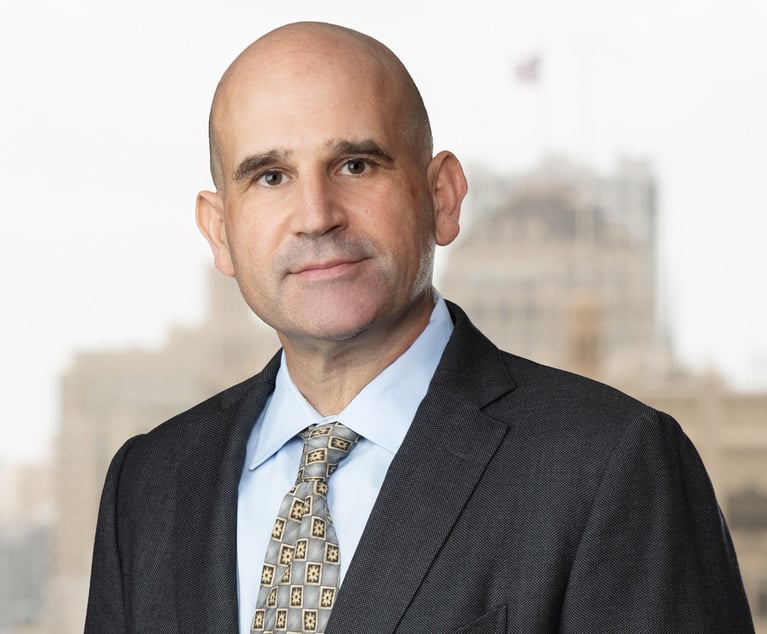 Nicole Ozer, Technology & Civil Liberties Director, ACLU of California (Photo: Courtesy photo)
Nicole Ozer, Technology & Civil Liberties Director, ACLU of California (Photo: Courtesy photo)Women Leaders in Tech Law 2018: Nicole Ozer, ACLU of California
Nicole Ozer helped spearhead the passage of landmark legislation giving the people of Oakland local control over law enforcement use of surveillance technologies including drones, social media surveillance and license plate readers.
November 12, 2018 at 01:43 PM
3 minute read
Nicole Ozer, the technology and civil liberties director for the American Civil Liberties Union of California, helped spearhead the passage of landmark legislation in May giving the people of Oakland local control over if and how law enforcement uses surveillance technologies including drones, social media surveillance and license plate readers.
What's one way technology has made your life easier?
I don't get lost.
One way it's made your life more difficult?
People can always find me.
Name a lawyer whose work you admire and why?
Professor Deirdre Mulligan [of UC Berkeley]. She is able to produce legal research that is highly respected in the academy. And that also has real-world applicability and important impact.
What's the best part about working in the tech sector?
The opportunity to help shape the future and defend and promote civil rights in the digital age.
What's the biggest challenge?
The incredibly fast pace of technological advancement and the relatively slow progress of legal change needed to properly protect civil liberties and civil rights.
What piece of advice do you give to lawyers considering a career in tech law?
Put yourself in the middle of interesting work, be creative, and develop strong relationships across many sectors.
What's one area of technology that you're most excited about?
Differential privacy and homomorphic encryption.
Name an important opportunity you got early in your career and what you did with it?
I was hired to develop the ACLU's first state technology project in 2004. Over the past fourteen years, I have built the ACLU of California Technology and Civil Liberties Project, and we have been at the forefront of much of the nation's cutting-edge work on government surveillance, consumer privacy and free speech and the Internet.
What's the best piece of career advice anyone ever gave you?
Be the kind of leader that people would follow voluntarily, even if you had no title or position. Being a good leader isn't about being perfect. Be human. Owning imperfections builds trust; hiding them doesn't.
No. 1 survival tip in a work crisis:
Stay calm, and make sure your team feels safe, supported and protected.
In 50 words or less, how far has the tech industry gone toward tackling its gender gap since you started practicing?
There has been much greater discussion and attention on both gender and diversity issues. But not particularly substantial movement in senior executive, board and investor communities. I do hope that real change is finally on the horizon.
What's one way you've had to change your thinking toward practicing law to succeed with tech industry clients?
To match the pace of our legal work to the extremely fact pace of innovation. To be creative in identifying the most efficient and effective legal and policy strategies to address an issue.
This content has been archived. It is available through our partners, LexisNexis® and Bloomberg Law.
To view this content, please continue to their sites.
Not a Lexis Subscriber?
Subscribe Now
Not a Bloomberg Law Subscriber?
Subscribe Now
NOT FOR REPRINT
© 2024 ALM Global, LLC, All Rights Reserved. Request academic re-use from www.copyright.com. All other uses, submit a request to [email protected]. For more information visit Asset & Logo Licensing.
You Might Like
View All
How the Deal Got Done: Sidley Austin and NWSL Angel City Football Club/Iger

How Uncertainty in College Athletics Compensation Could Drive Lawsuits in 2025

How I Made Practice Group Chair: 'Think About Why You Want the Role, Because It Is Not an Easy Job,' Says Aaron Rubin of Morrison Foerster

Outgoing USPTO Director Kathi Vidal: ‘We All Want the Country to Be in a Better Place’
19 minute readTrending Stories
- 1Judicial Ethics Opinion 24-89
- 2It's Time To Limit Non-Competes
- 3Jimmy Carter’s 1974 Law Day Speech: A Call for Lawyers to Do the Public Good
- 4Second Circuit Upholds $5M Judgment Against Trump in E. Jean Carroll Case
- 5Clifford Chance Hikes Partner Pay as UK Firms Fight to Stay Competitive on Compensation
Who Got The Work
Michael G. Bongiorno, Andrew Scott Dulberg and Elizabeth E. Driscoll from Wilmer Cutler Pickering Hale and Dorr have stepped in to represent Symbotic Inc., an A.I.-enabled technology platform that focuses on increasing supply chain efficiency, and other defendants in a pending shareholder derivative lawsuit. The case, filed Oct. 2 in Massachusetts District Court by the Brown Law Firm on behalf of Stephen Austen, accuses certain officers and directors of misleading investors in regard to Symbotic's potential for margin growth by failing to disclose that the company was not equipped to timely deploy its systems or manage expenses through project delays. The case, assigned to U.S. District Judge Nathaniel M. Gorton, is 1:24-cv-12522, Austen v. Cohen et al.
Who Got The Work
Edmund Polubinski and Marie Killmond of Davis Polk & Wardwell have entered appearances for data platform software development company MongoDB and other defendants in a pending shareholder derivative lawsuit. The action, filed Oct. 7 in New York Southern District Court by the Brown Law Firm, accuses the company's directors and/or officers of falsely expressing confidence in the company’s restructuring of its sales incentive plan and downplaying the severity of decreases in its upfront commitments. The case is 1:24-cv-07594, Roy v. Ittycheria et al.
Who Got The Work
Amy O. Bruchs and Kurt F. Ellison of Michael Best & Friedrich have entered appearances for Epic Systems Corp. in a pending employment discrimination lawsuit. The suit was filed Sept. 7 in Wisconsin Western District Court by Levine Eisberner LLC and Siri & Glimstad on behalf of a project manager who claims that he was wrongfully terminated after applying for a religious exemption to the defendant's COVID-19 vaccine mandate. The case, assigned to U.S. Magistrate Judge Anita Marie Boor, is 3:24-cv-00630, Secker, Nathan v. Epic Systems Corporation.
Who Got The Work
David X. Sullivan, Thomas J. Finn and Gregory A. Hall from McCarter & English have entered appearances for Sunrun Installation Services in a pending civil rights lawsuit. The complaint was filed Sept. 4 in Connecticut District Court by attorney Robert M. Berke on behalf of former employee George Edward Steins, who was arrested and charged with employing an unregistered home improvement salesperson. The complaint alleges that had Sunrun informed the Connecticut Department of Consumer Protection that the plaintiff's employment had ended in 2017 and that he no longer held Sunrun's home improvement contractor license, he would not have been hit with charges, which were dismissed in May 2024. The case, assigned to U.S. District Judge Jeffrey A. Meyer, is 3:24-cv-01423, Steins v. Sunrun, Inc. et al.
Who Got The Work
Greenberg Traurig shareholder Joshua L. Raskin has entered an appearance for boohoo.com UK Ltd. in a pending patent infringement lawsuit. The suit, filed Sept. 3 in Texas Eastern District Court by Rozier Hardt McDonough on behalf of Alto Dynamics, asserts five patents related to an online shopping platform. The case, assigned to U.S. District Judge Rodney Gilstrap, is 2:24-cv-00719, Alto Dynamics, LLC v. boohoo.com UK Limited.
Featured Firms
Law Offices of Gary Martin Hays & Associates, P.C.
(470) 294-1674
Law Offices of Mark E. Salomone
(857) 444-6468
Smith & Hassler
(713) 739-1250






